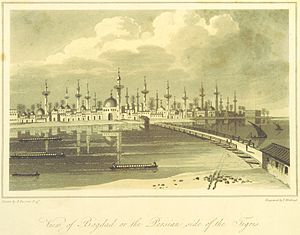Ibn al-Jawzi
| Imam Ibn al-Jawzī | |
|---|---|

A depiction of Baghdad from 1808, taken from the print collection in Travels in Asia and Africa, etc. (ed. J. P. Berjew, British Library); Ibn al-Jawzī spent his entire life in this city in the twelfth-century
|
|
| Jurisconsult, Preacher, Traditionist; Shaykh of Islam, Orator of Kings and Princes, Imam of the Hanbalites |
|
| Venerated in | Sunni Islam, but particularly in the Hanbali school of jurisprudence (Salafi Sunnis honor rather than venerate him) |
| Major shrine | Tomb of Ibn al-Jawzī, Baghdad, Iraq |
| Ibn al-Jawzī | |
|---|---|
| Title | Shaykh al-Islam |
| Born | c. 510 AH/1126 CE Baghdad, Iraq |
| Died | 597 AH/14 June 1200 (aged 74) Baghdad, Iraq |
| Ethnicity | Arab |
| Era | Islamic golden age |
| Religion | Islam |
| Denomination | Sunni |
| Jurisprudence | Hanbali |
| Creed | Ash'ari |
| Main interest(s) | History, Tafsir, Hadith, Fiqh |
|
Influenced
|
|
ʿAbd al-Raḥmān b. ʿAlī b. Muḥammad Abu ’l-Faras̲h̲ b. al-Jawzī (1126 – 14 June 1200), often referred to as Ibn al-Jawzī (Arabic: ابن الجوزي, Ibn al-Jawzī; 1126 – 14 June 1200) for short, or reverentially as Imam Ibn al-Jawzī by Sunni Muslims, was an Arab Muslim jurisconsult, preacher, orator, heresiographer, traditionist, historian, hagiographer, and philologist who played an instrumental role in propagating the Hanbali school of orthodox Sunni jurisprudence in his native Baghdad during the twelfth-century. During "a life of great intellectual, religious and political activity," Ibn al-Jawzi came to be widely admired by his fellow Hanbalis for the tireless role he played in ensuring that that particular school – historically, the smallest of the four principal Sunni schools of law – enjoy the same level of "prestige" often bestowed by rulers on the Maliki, Shafi'i, and Hanafi rites.
Belonging to a wealthy family, Ibn al-Jawzi received a "very thorough education" during his adolescent years, and was fortunate to train under some of that era's most renowned Baghdadi scholars, including Ibn al-Zāg̲h̲ūnī (d. 1133), Abū Bakr al-Dinawarī (d. 1137-8), and Abū Manṣūr al-Jawālīkī (d. 1144-5). Although Ibn al-Jawzi's scholarly career continued to blossom over the next few years, he became most famous during the reign of al-Mustadi (d. 1180), the thirty-third caliph of the Abbasid Caliphate, whose support for Hanbalism allowed Ibn al-Jawzi to effectively become "one of the most influential persons" in Baghdad, due to the caliph's approval of Ibn al-Jawzi's public sermonizing to huge crowds in both pastoral and urban areas throughout Baghdad. In the vast majority of the public sermons delivered during al-Mustadi's reign, Ibn al-Jawzi often presented a stanch defense of the prophet Muhammad's example, and vigorously criticized all those whom he considered to be schismatics in the faith. At the same time, Ibn al-Jawzi's reputation as a scholar continued to grow due to the substantial role he played in managing many of the most important universities in the area, as well as on account of the sheer number of works he wrote during this period. As regards the latter point, it is important to note that part of Ibn al-Jawzi's legacy rests on his reputation for having been "one of the most prolific writers" of all time, with later scholars like Ibn Taymiyyah (d. 1328) studying over a thousand works written by Ibn al-Jawzi during their years of training. As scholars have noted, Ibn al-Jawzi's prodigious corpus, "varying in length" as it does, touches upon virtually "all the great disciplines" of classical Islamic study.
...
Wikipedia
